From StephanKinsella.com:
Fusillo on the Universal Principles of Liberty and Liberland
Related
- The Universal Principles of Liberty
- Kinsella, “Announcing the Universal Principles of Liberty“
- Libertarian Nation and Related Projects
Alessandro Fusillo recently appeared on LA NOSTRA LIBERTÀ [OUR FREEDOM] – FUSILLO live – Puntata 156 (01-10-2025).
A summary and translation of the transcript are provided below.
Grok summary:
Opening Remarks on Italy’s State of Civilization
Timestamp: 0:01
The episode begins with a statement emphasizing that current events in Italy are unworthy of a civilized country, and the speakers position themselves as defenders of maintaining some level of civilization, expressing confidence in winning the ongoing battle.
Introduction to the Broadcast
Timestamp: 0:54
Host Fabio welcomes listeners to the live Border Nights broadcast at 7:10 PM, greeting guest Alessandro Fusillo. They outline the agenda: discussing topics, awaiting updates on the Gaza flotilla with irreverent commentary, and addressing listener questions. Fabio introduces the theme of freedom, referencing a photo to prompt Alessandro’s explanation.
The Universal Principles of Liberty and Birtawil Project
Timestamp: 2:00
Alessandro describes a photo from a project he’s proud of, featuring himself, Hans-Hermann Hoppe, Freemax, David Dürr, and Stephan Kinsella. Freemax’s initiative aims to create a free community in an unclaimed desert area between Egypt and Sudan, called Birtawil, inspired by projects like Rose Island and Liberland but without forming a state. Unlike Liberland’s libertarian state model, Birtawil starts with basic rules condensed in the “Universal Principles of Justice,” a document based on libertarian principles like non-aggression and natural law. This document, printed on parchment and placed on the blockchain for perpetuity, is open for signatures via a website Alessandro shared on Telegram. The goal is to build a global community of free people united by these principles, not tied to territory. Alessandro plans to translate it into Italian soon and sees it as filling a void in the libertarian community post the libertarian movement’s closure. The project was launched at the Property and Freedom Society’s annual meeting in Bodrum.
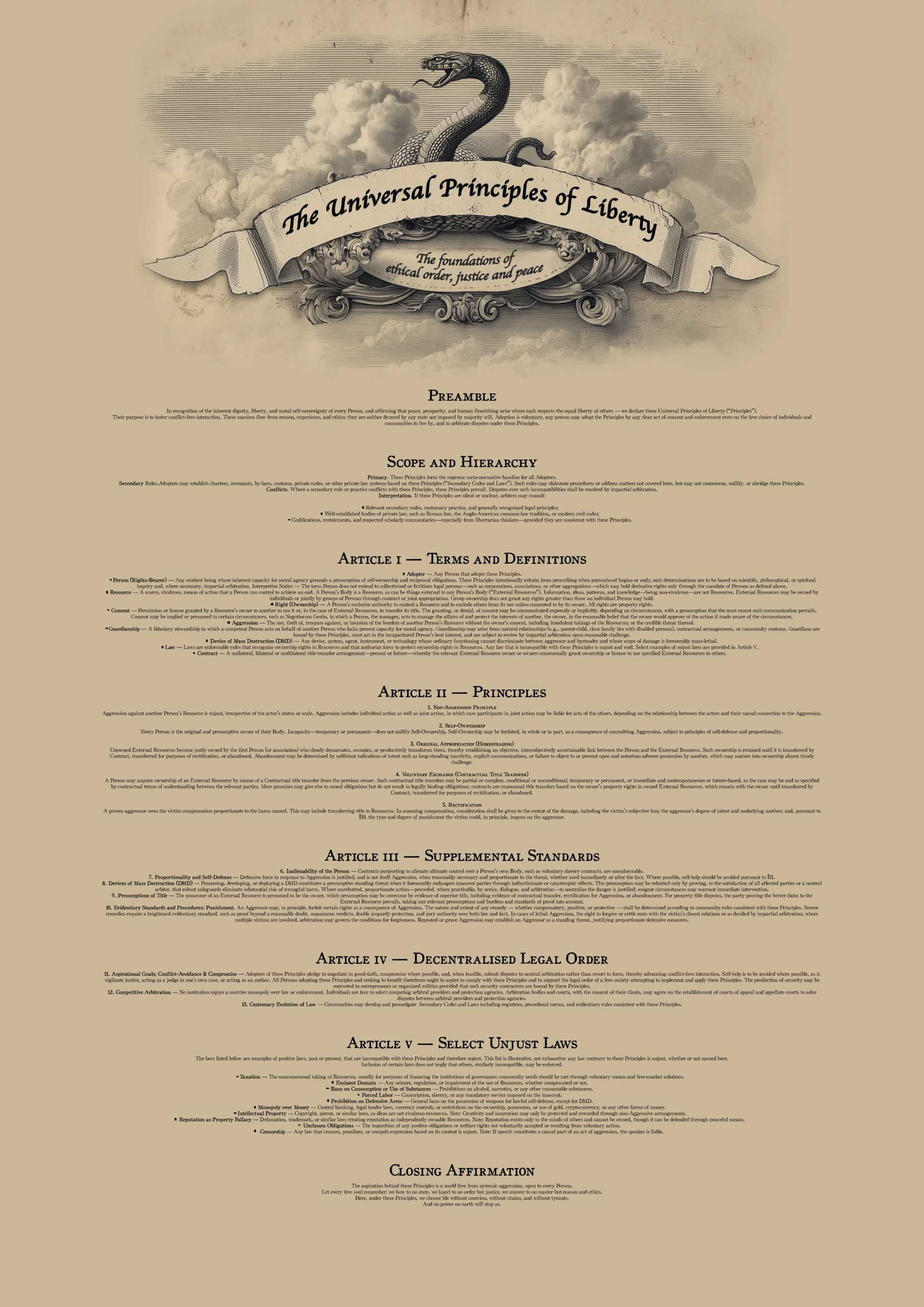
Upcoming Libertarian Initiatives
Timestamp: 7:52
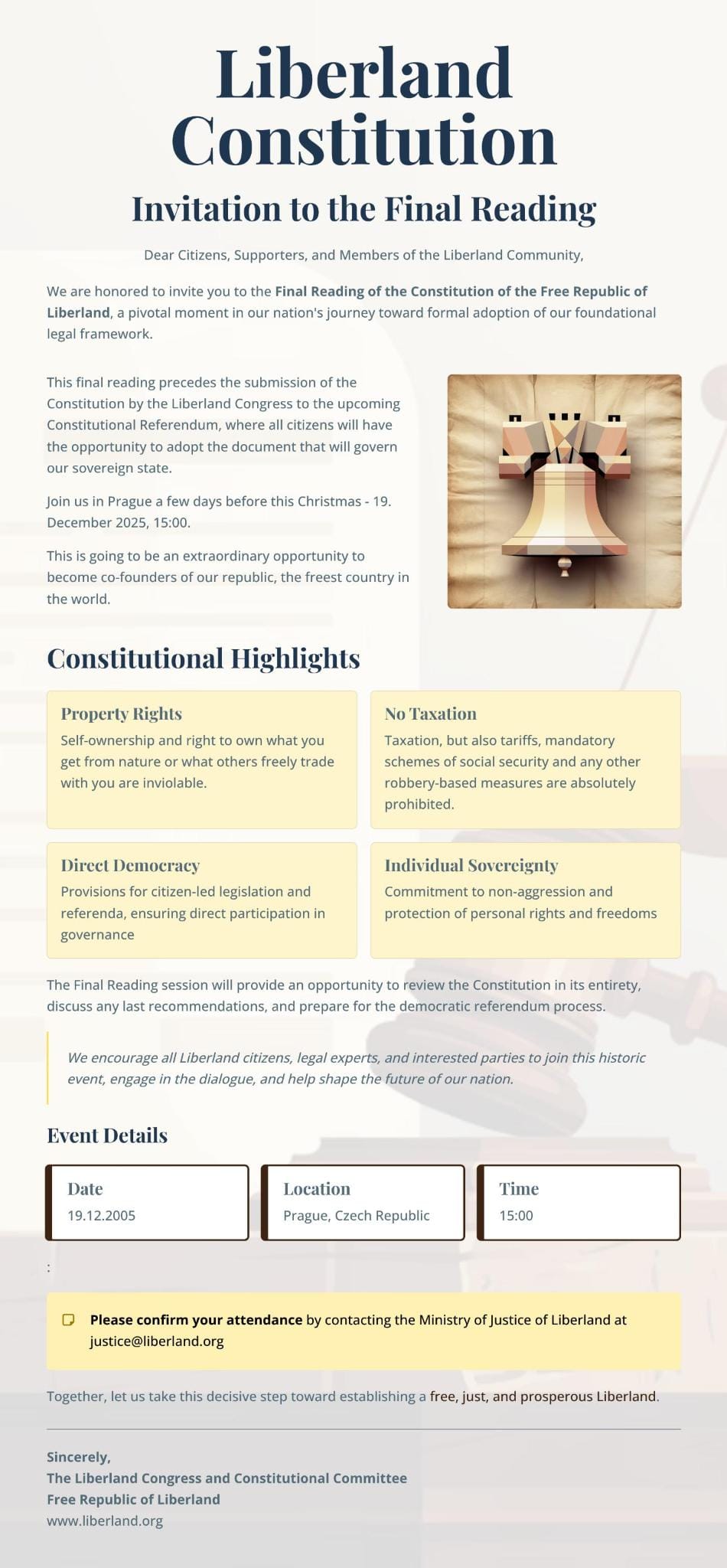 Alessandro mentions attending the official reading of Liberland’s constitution in Prague in December, with attendees including Stephan Kinsella and Hans-Hermann Hoppe. He highlights the growing alliance among global libertarian activists, emphasizing universalism without borders. He plans to expand the Birtawil project and notes Mark Victor’s upcoming “Live and Let Live” movement, which promotes simple libertarian ideas like non-aggression as revolutionary against government oppression. This aligns with pursuing individual happiness free from figures like Trump, Gates, or Schwab.
Alessandro mentions attending the official reading of Liberland’s constitution in Prague in December, with attendees including Stephan Kinsella and Hans-Hermann Hoppe. He highlights the growing alliance among global libertarian activists, emphasizing universalism without borders. He plans to expand the Birtawil project and notes Mark Victor’s upcoming “Live and Let Live” movement, which promotes simple libertarian ideas like non-aggression as revolutionary against government oppression. This aligns with pursuing individual happiness free from figures like Trump, Gates, or Schwab.
Reflections on Liberland
Timestamp: 11:17
Fabio recalls interviewing Liberland founder Vit Jedlička in 2016, discussing its tax-free, merit-based currency model in the no-man’s-land between Serbia and Croatia. Alessandro updates that the project progresses despite challenges, with Italians building structures amid tolerant Serbian attitudes but occasional Croatian disruptions. Many passports have been issued, reflecting a strong desire for freedom.
Voter Apathy in the Marche Region Elections
Timestamp: 2:09 PM
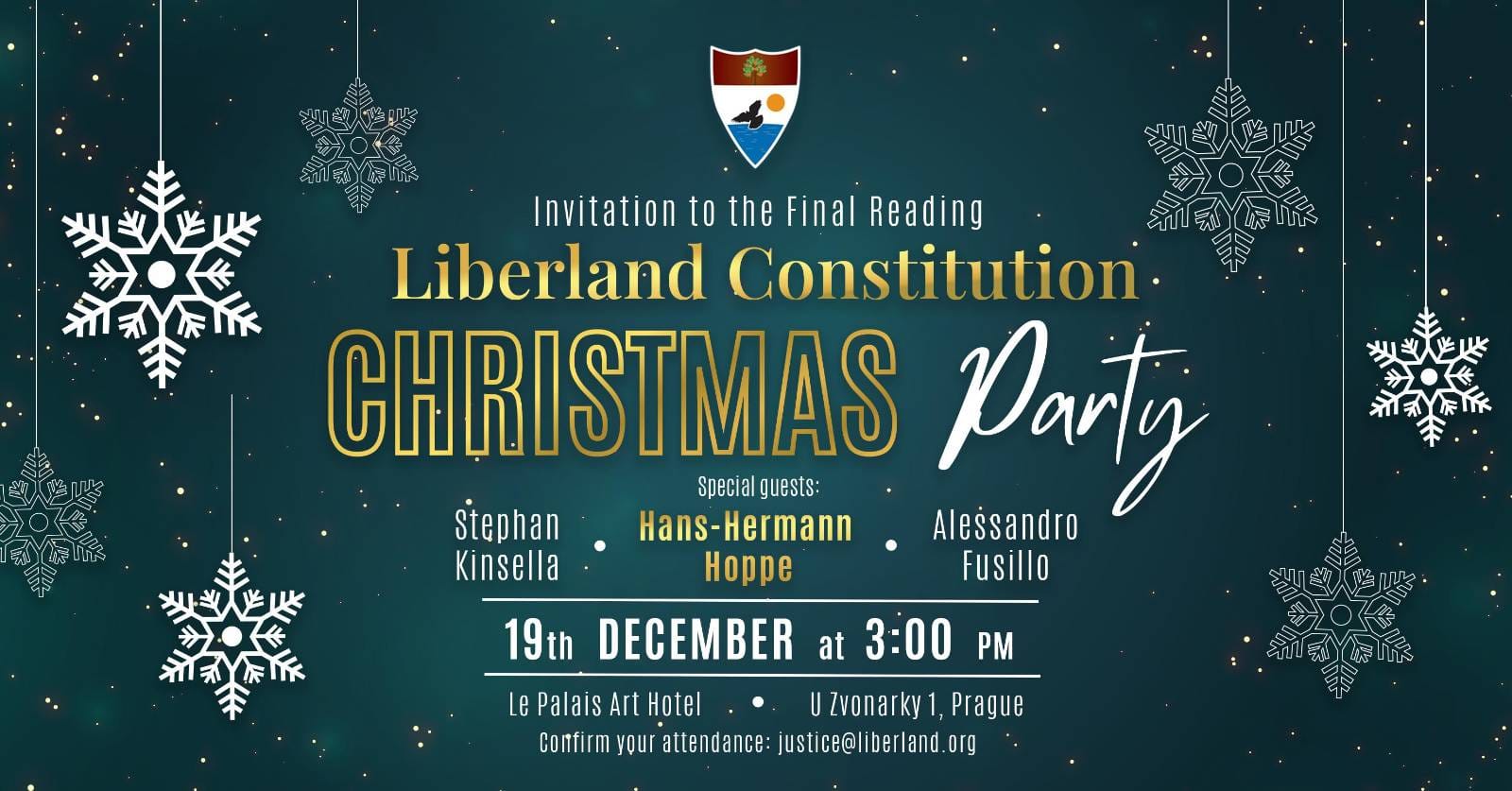
Fabio notes low voter turnout in the Marche elections (around 50%), seeing it as a sign of awakening rather than laziness, contrasting with mainstream concerns. Alessandro agrees, criticizing politicians like Ricci for absurd pandemic measures like one-way pedestrian streets. He views non-voting as awareness of voting’s uselessness, as policies remain unchanged regardless of winners, decided by external forces. Politicians lack legitimacy, and non-voting signals rejection of the system, akin to a plantation slave refusing to choose a supervisor. He cites historical parallels like the Roman Empire’s irrelevant elections under dictatorship and compares the EU to an overriding “cancer” on national systems. Boycotting elections affirms individual sovereignty.
Satirical Commentary on Political Dichotomies
Timestamp: 25:36
Fabio plays a satirical clip from Corrado Guzzanti as Father Pizzarro, mocking right-left divides as invented to encourage voting and share power, with examples like Berlusconi. Alessandro affirms its accuracy: elections distribute perks without real change. Fabio discusses voting’s irrelevance, even for anti-system candidates promising exits from NATO or Europe, as mockery of uninformed voters.
The Gaza Flotilla and International Law
Timestamp: 34:19
Fabio updates on Israel’s halt to the Gaza flotilla, citing violations of international law and potential confiscation. He expresses skepticism due to mainstream coverage and participants like Greta Thunberg and PD politicians, separating facts from untrustworthy figures. Alessandro shares perplexity, noting international law’s inconsistency (e.g., applicable to immigrants too). He critiques pro-Israel propaganda over two years, justifying genocide as self-defense, influenced by AIPAC. Recent initiatives like protests and strikes may counter narrative errors drawing people to counter-information. He suspects Soros funding and migration agendas, distracting from Trump’s neocolonial “peace plan” ignoring Palestinian property rights. The flotilla is cosmetic amid Israel’s 80-year destruction. Updates suggest boarding and expulsion. Alessandro slams union leader Landini for hypocrisy, urging members to quit CGIL, CISL, and UIL for supporting vaccine mandates and wage declines.
Clarification on Libertarian Views on Unions
Timestamp: 50:38
Responding to a listener, Alessandro clarifies libertarians oppose current unions’ violence and property violations but support free worker associations. He criticizes entrepreneurs as government-dependent corporatists, not true value-creators.
Listener Questions: Advance Medical Treatment Declarations (DAT)
Timestamp: 52:49
Fabio reads Luca’s question on DATs and health records. Alessandro explains they are separate systems; obscuring records doesn’t affect DATs. He advises appointing a representative for emergencies, as DATs lack guaranteed consideration without one.
Listener Questions: TARI Waste Tax and PagoPA
Timestamp: 56:13
Fabio shares Barbara’s query on new TARI charges (UR1-UR3) covering social bonuses, seen as mockery. Alessandro confirms legality but criticizes it as redistribution among victims. PagoPA-only payment is illegal; cash must be allowed. He advocates liberalizing waste collection from monopoly for efficiency and innovation, like AI sorting.
Listener Questions: Moped Tax and Statute of Limitations
Timestamp: 1:03:17
Fabio reads Laura’s question on moped tax reminders. Alessandro notes 2021 tax prescribes December 31, 2024; regular mail reminders are invalid. Challenge tax bills via appeal if properly notified.
Listener Questions: The Great Taking Book
Timestamp: 1:06:38
Fabio mentions a book attachment. Alessandro knows author David Webb, praising the book on legislative changes dematerializing securities, risking loss in crises due to non-segregation. Recommends the Italian translation, documentary The Great Taking, and related films like Planet Lockdown.
Listener Questions: Private Property and Libertarian Money
Timestamp: 1:13:11
Fabio reads COS’s question on promoting private money. Alessandro advocates gold and Bitcoin as real money alternatives to fiat, noting libertarian initiatives. Prices have risen, reflecting fiat’s devaluation.
Closing Remarks and Future Broadcasts
Timestamp: 1:15:42
Fabio highlights new Bitcoin and gold segments, mentions an upcoming event. They sign off, reminding email for questions.
Transcript:
Opening Remarks on Italy’s State of Civilization
Timestamp: 0:01
Speaker: Unknown (likely Alessandro Fusillo)
What is happening is unworthy of a civilized country.
Timestamp: 0:24
Speaker: Unknown (likely Alessandro Fusillo)
And we are the ones who are defending the fact that Italy still remains a little bit of a civilized country, and we will win this battle.
Timestamp: 0:38
[Music]
Introduction to the Broadcast
Timestamp: 0:54
Speaker: Fabio (Host)
Good evening, good evening, Border Nights friends. It’s 7:10 PM, live. Welcome back to Alessandro.
Timestamp: 1:02
Speaker: Alessandro Fusillo
Hello, Fabio, and good evening, as always, to all viewers and listeners of Border Nights.
Speaker: Fabio
A few things to tell, to discuss with you, then answer the questions at the end. Well, while waiting for the flotilla to arrive in Gaza, the last message indicates that some boats are heading toward the members of this initiative, about five miles from them. Oh well, based on what comes out, we will comment on it, as always, in a slightly irreverent way and obviously trying to go beyond what seems apparent. And yet, let’s start from a concept that inevitably comes to mind and heart, which is that of freedom. There is this photo that perhaps allows us to begin. Alessandro, what does this photo represent?
The Universal Principles of Liberty and Birtawil Project
Timestamp: 2:00
Speaker: Alessandro Fusillo
This photo represents a project I participated in and of which I’m very proud. I posted about it a few days ago on my Telegram channel to introduce it. In the photo, from left to right, you see me, then Professor Hans-Hermann Hoppe, Freemax, who is the initiator of this project, Professor David Dürr, and Stephan Kinsella, a fellow lawyer and writer of libertarian works. What’s the idea? Freemax, the young man in the center, has identified a territory somewhat similar to that of Liberland, but in an absolutely prohibitive area, a piece of desert between Egypt and Sudan. It is a territory not claimed by any state, and his project is to build a free community there that is not a state and follows, to some extent, the example of Rose Island, Liberland, and other projects of this kind. The difference, however, compared to other projects, for example, Liberland, which aims to build a libertarian, liberal state—still a state, even if without taxation or coercion, with certainly sound principles from a libertarian point of view—is that the idea of this area, called Birtawil, is to start from basic rules. This document, which you can see in the photo, Max had printed on a sort of parchment, and it represents the Universal Principles of Justice. It is a condensation, if you like, of libertarian principles and, therefore, the basic elements that constitute law from a libertarian perspective, a law obviously founded on natural law, based on human rationality and Justice with a capital “J,” not on the creation of rules by institutions of various names. We have therefore tried to condense into a few, very few pages, the fundamental principles, which are those we have spoken about many times here and which can be traced back to the core principle of non-aggression. The idea is to open this document for signature by anyone who wants to do so. I published the site on my Telegram channel, from which you can access the document, read it, download it, and sign it. This document has been put on the blockchain, so in some way, it is written on the ledger we know, which contains Bitcoin, basically, but this gives it a sort of digital, electronic perpetuity. The document remains there, and whoever wants to share it, anyone interested, can sign it. What’s my idea? To create a community of people who share this document, a document that constitutes a community of free people who are not necessarily tied to a territory or to being in some place but can simply join by sharing these principles condensed in this document. As you know, I am always committed to things that never end, so I still have to translate it into Italian, and I apologize for that. I will do it in the next few days so that the document can also be read and understood in Italian. It’s a bit like giving concrete form to this libertarian community, right? Who are we libertarians? We are generally scattered, but libertarianism often rhymes, or in any case, is combined with a certain individualism, and therefore, the idea is to gather around a document that somehow summarizes the fundamental principles of freedom from the libertarian point of view. If you read it, surely many of those who follow me and who have found interest in libertarian ideas will see a profound resonance with what is written. In fact, the inspirer of this document is Hans-Hermann Hoppe, whom you saw in the photo and who, in my opinion, and according to many others, is the greatest living libertarian thinker, a student of Murray Rothbard. So, we wanted to start this project. 我们 presented it with this photo, with the official signature of the document by the participants in the initiative right in Bodrum, at the annual meeting of Hoppe’s organization, called the Property and Freedom Society, that is, the Property and Freedom Society, and so there we gave it a bit of an official start to this project, which runs in parallel with other things.
Upcoming Libertarian Initiatives
Timestamp: 7:52
Speaker: Alessandro Fusillo
For example, in December, I will be in Prague for the official reading of the Constitution of Liberland, which is different from the draft of the Universal Principles of Justice but still falls within the scope of these libertarian initiatives to try to build communities that unite around the principles of freedom. I will be there, there will be Stephan Kinsella, the lawyer friend you saw in the photo, there will also be Hans-Hermann Hoppe, and then probably some other guests. Libertarianism is moving, and we Italian libertarians, however small, however not particularly structured, are united in this association, let’s call it that, an alliance between organizations and libertarian activists all over the world, because one of the basic ideas of libertarianism is also a certain universalism, right? There aren’t any borders, there are no limits, and so we libertarians, though Italian, are connected with these people, especially Hoppe, as I was saying, the guru of international libertarianism. So, we see this project. Now I will give it more structure, more emphasis in the coming months. It was a bit like what I announced after the closure of the libertarian movement. In my opinion, a void remains, a space to fill within the libertarian community, and this is the project from which we will do it. There are other initiatives, for example, my dear friend, the lawyer Mark Victor, an American, will launch a movement next year called “Live and Let Live.” This is also a way to present the basic ideas of libertarianism with simple principles, right? “Live and let live” is a principle with which one can hardly disagree. Yet, even applied consistently, exactly like the principle of non-aggression, it ends up being an absolutely revolutionary idea. If you think that those who don’t let us live nor want to leave us in peace are the governments that never miss an opportunity to oppress us with various schemes of obligations, prohibitions, etc. So, there is a movement that is centered around the idea of freedom, individual freedom, and respect for what the American patriots, the American Founding Fathers, called the pursuit of happiness. And that’s a bit like the aspiration of each of us to fill our lives with what corresponds to our individual project and not to someone else’s project, like Trump, Bill Gates, Klaus Schwab, or other people of this kind.
Reflections on Liberland
Timestamp: 11:17
Speaker: Fabio
You reminded us of Liberland, a sign that, even if we didn’t know each other at the time, Alessandro, we’ve always had a common feeling. When I read this news about the first cries of Liberland, I immediately got in touch with Liberland and did an interview. It was November 29, 2016, a radio interview because at the time we only did radio and podcasts. We interviewed Vit Jedlička, the founder of Liberland. Alberto Medici gave us a hand with the translation. He greets us, and we talked about this Liberland, this no-man’s-land between Serbia and Croatia, a state without taxes, with a currency, I don’t know if that one is still used, based on merit, on the commitment to the community. So, we were asking ourselves: a provocation, a dream? Nine years have passed, and has someone gone to live there? Maybe I’ve already asked you once, what kind of development has there been?
Timestamp: 12:39
Speaker: Alessandro Fusillo
The project is obviously very difficult to follow. Vit, among other things, was at the conference in Bodrum where I was, so I had the opportunity to chat a bit and ask him for updates. The project is moving forward; they’re starting to build some slightly more structured buildings, among other things, by Italians who are there and taking care of it. The infrastructural part is always difficult because, while Serbia has a relatively tolerant attitude, periodically there are problems, especially with the Croats, who some time ago went to dismantle the tents and temporary structures that were there. But it seems that there is a moment of calm now, and so they are trying to start some more structured constructions. The project has basically remained the same as when you interviewed Vit. Does this Liberland currency, based on merit, still exist? Many Liberland passports have been issued over the years, so there are many initiatives and a great desire for freedom. The more they operate on one side, the more there is a desire for freedom on the other.
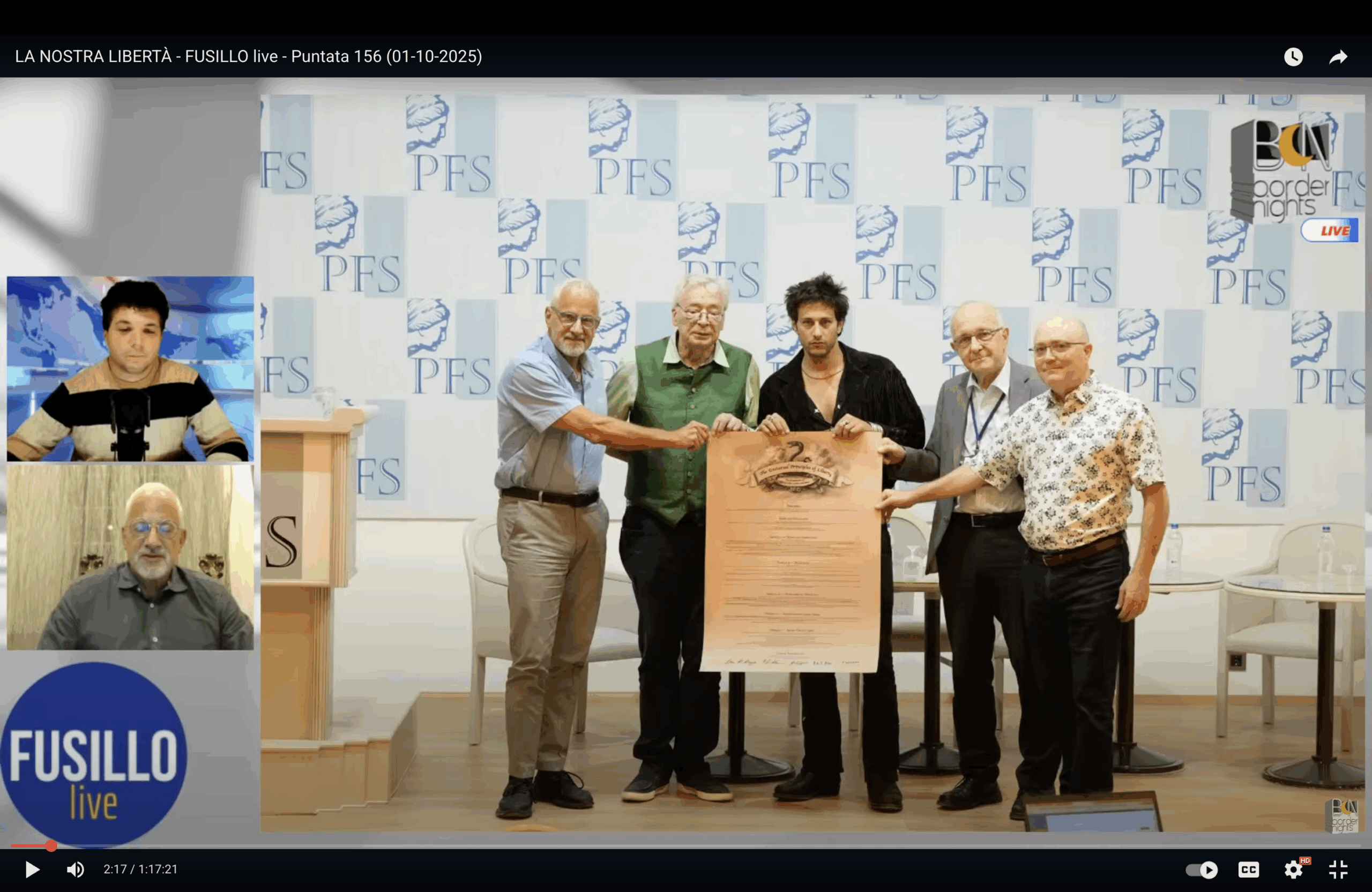
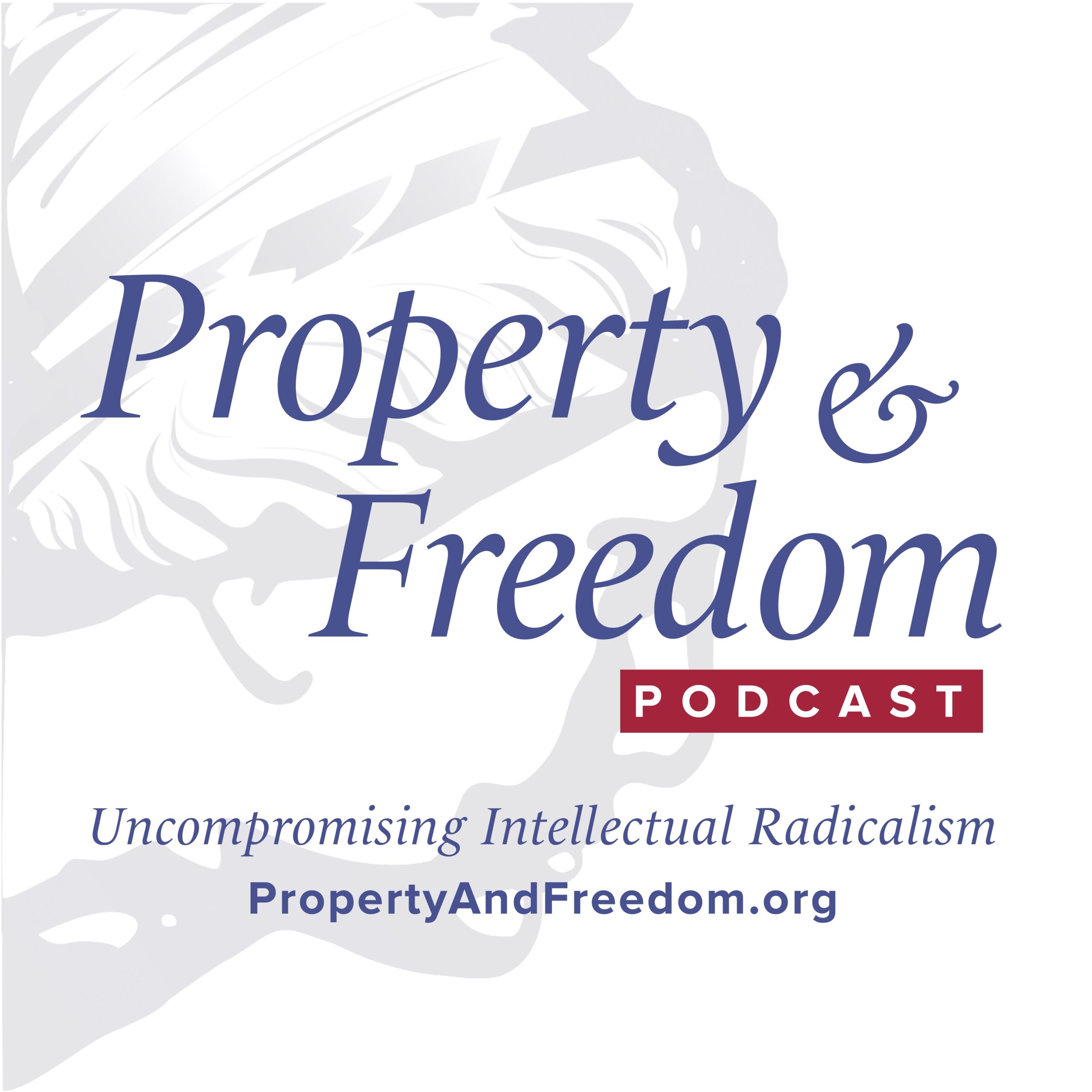
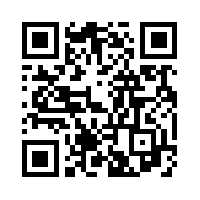
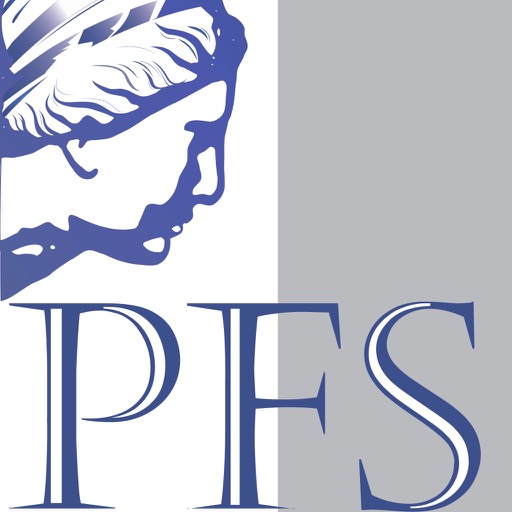
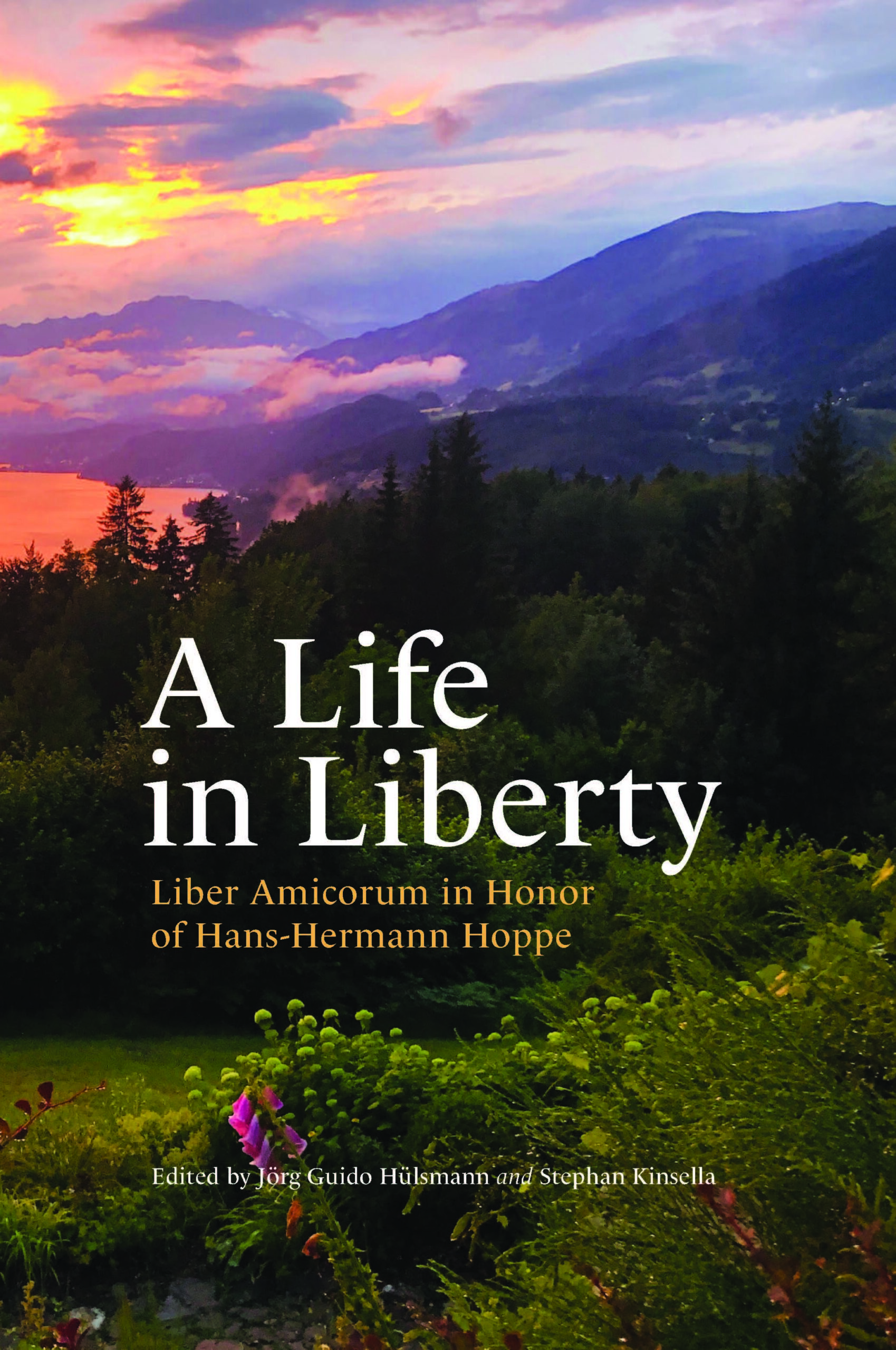
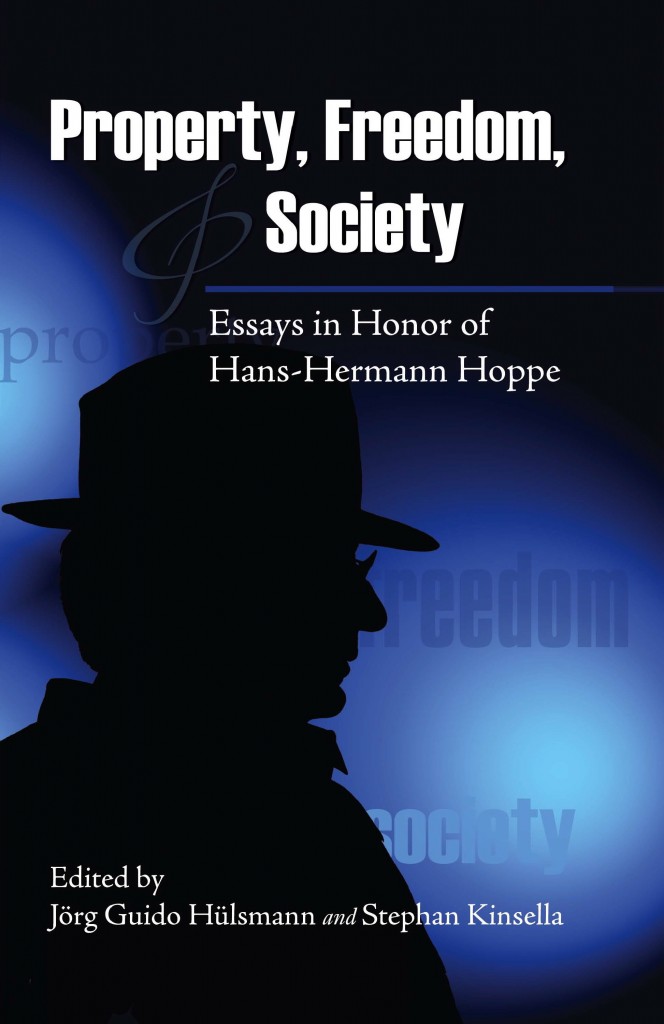
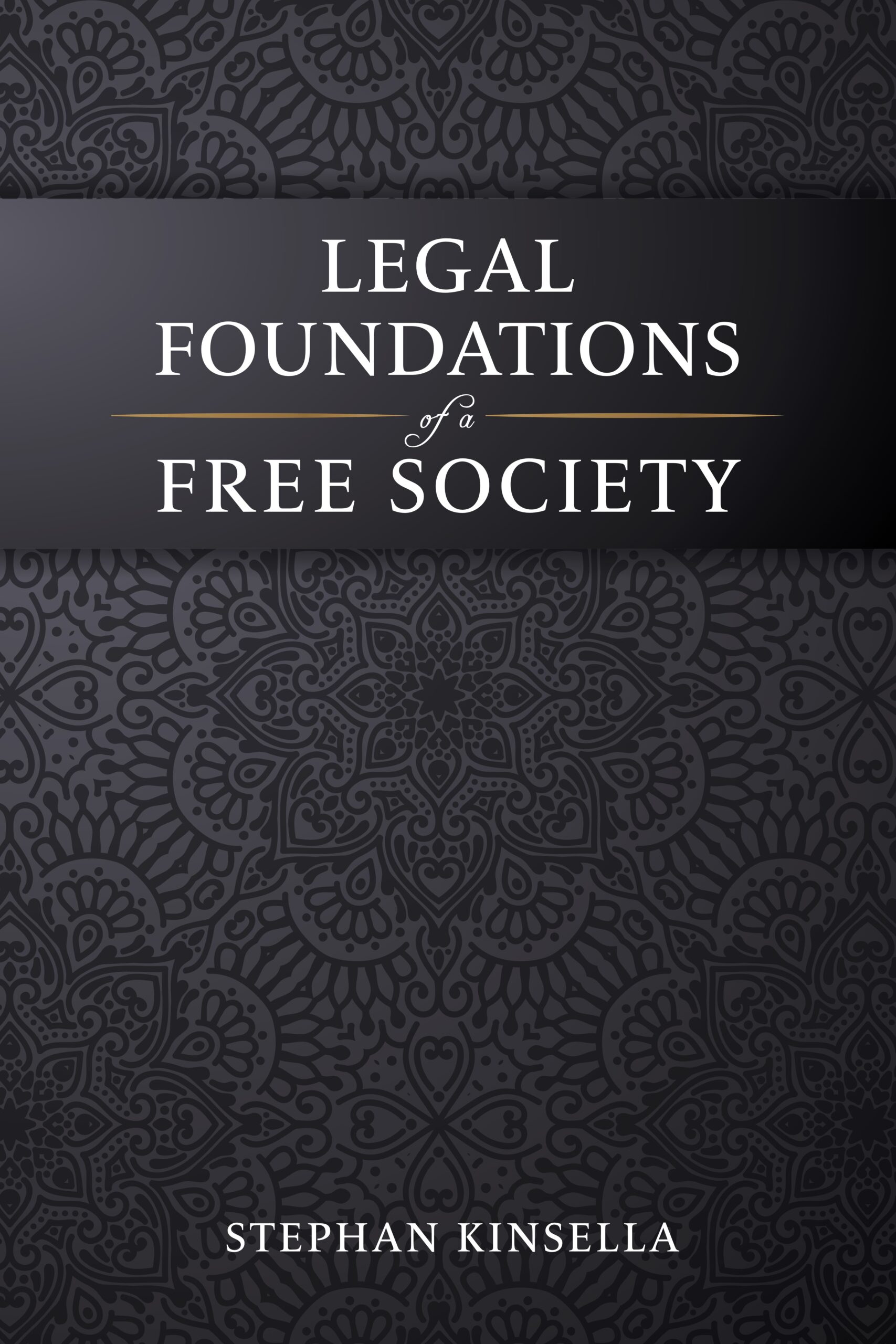
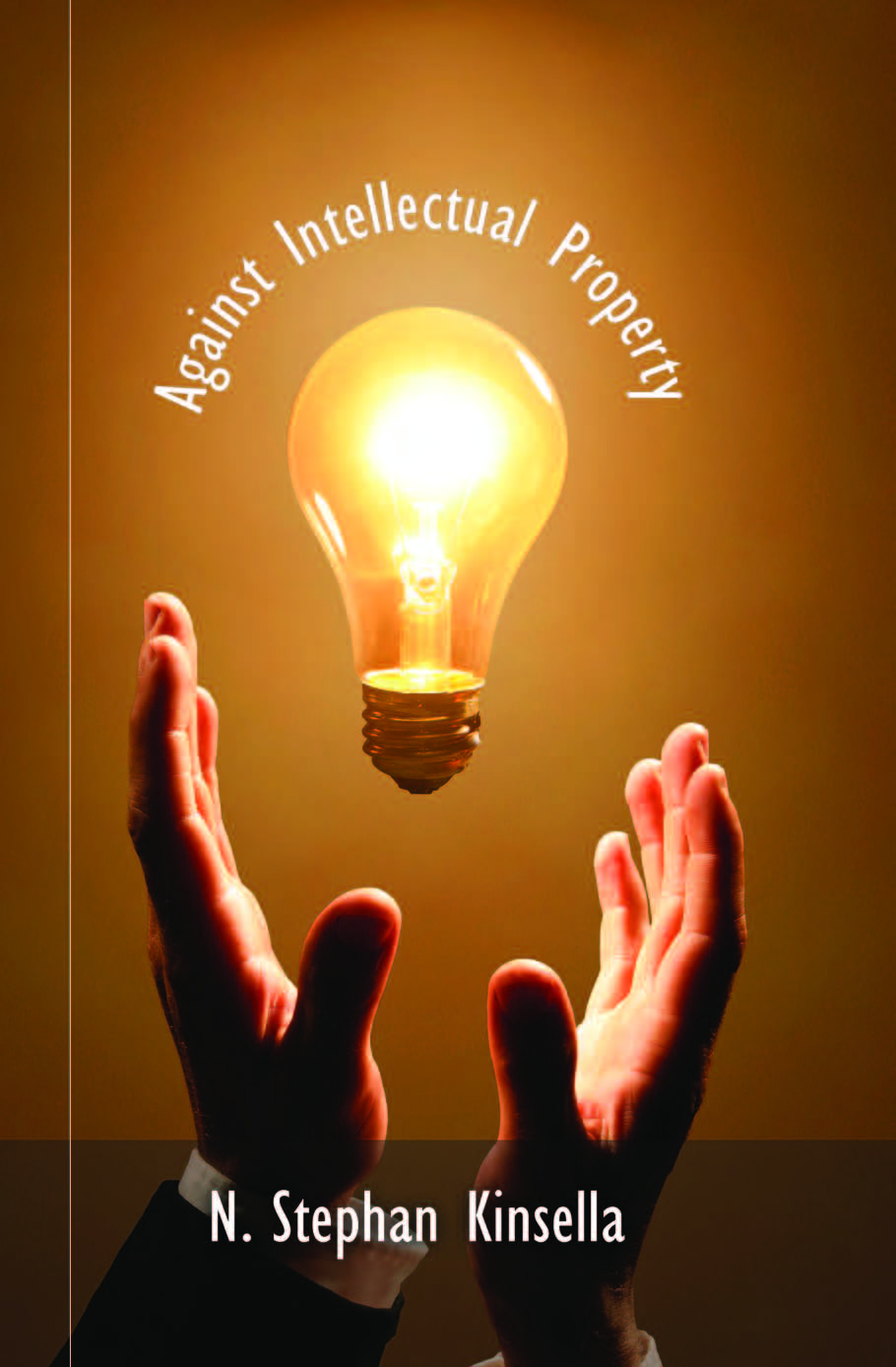
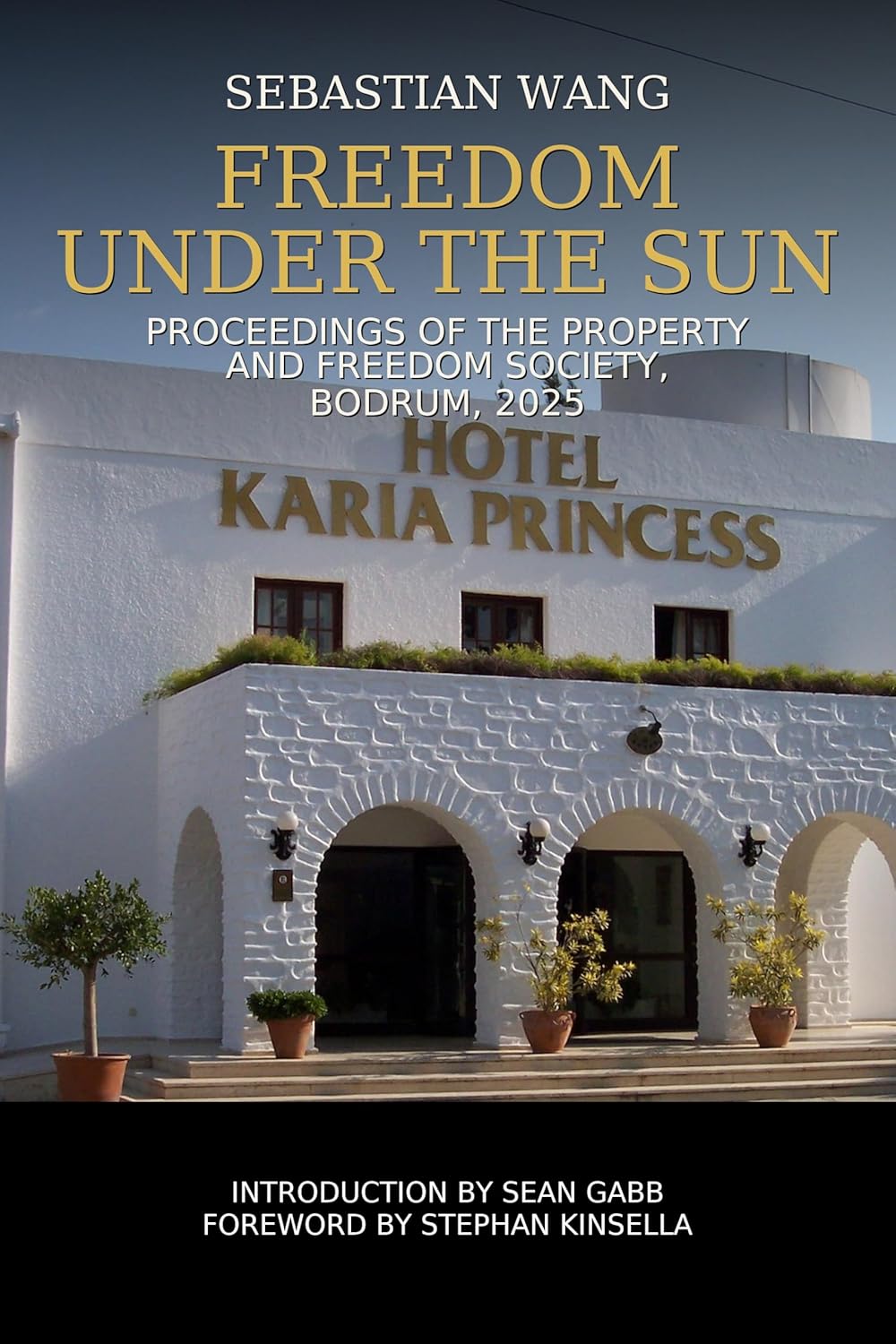
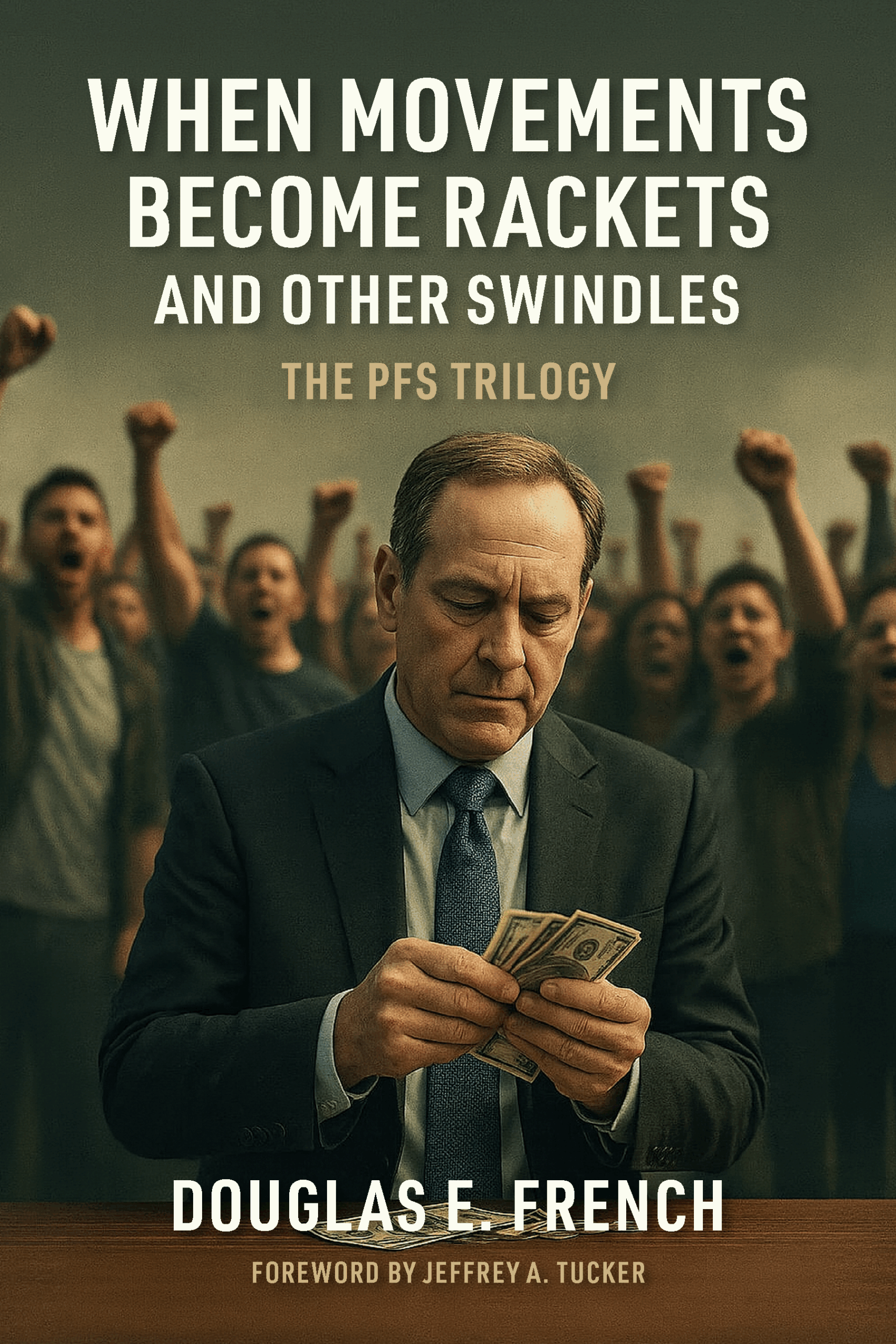


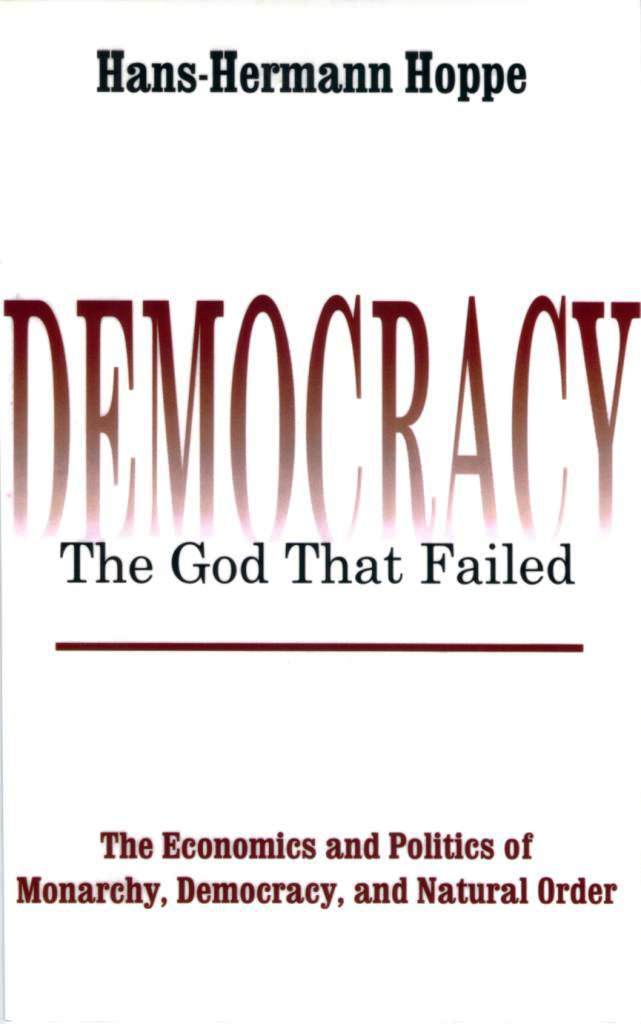


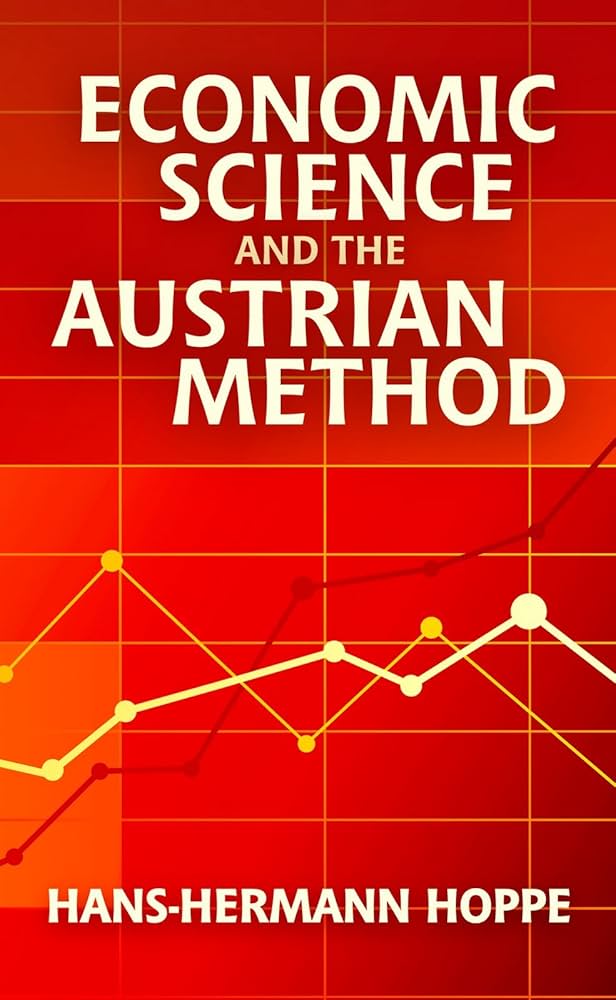
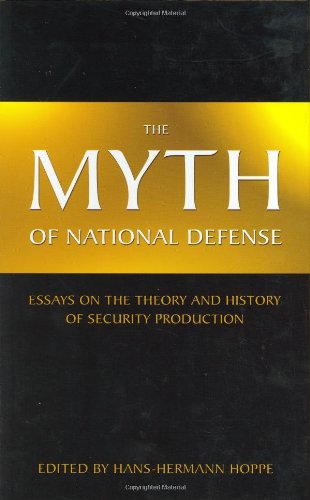
You must log in to post a comment. Log in now.